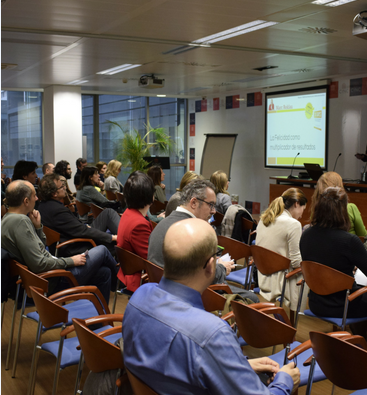all completamente, totalmente, todo
almost casi
awfully terriblemente, muy
completely completamente
deeply enough entirely extremely fairly frightfully greatly just
much nearly only perfectly pretty quite rather really slightly so
somewhat terribly thoroughly too
utterly very
very much wholly
He lives all alone
He was all covered in mud
The stadium was almost empty Our son is fully bilingual
The colours match perfectly Gustave is slightly older than me He was somewhat surprised that
his team had won the match She’s really gorgeous in that dress
profundamente bastante (v. nota 1) enteramente extremadamente bastante (v. nota 2) tremendamente grandemente
justamente, precisamente (v. 15.31) mucho
casi solamente
perfectamente, a la perfección bastante, muy
completamente, bastante (v. 15.27) bastante (v. nota 2)
realmente ligeramente tan
algo, un poco terriblemente, muy completamente demasiado (v. 15.28) totalmente
muy (v. tamb. 15.9 y 15.33) muchísimo
enteramente, completamente
Vive completamente solo Estaba todo cubierto de barro El estadio estaba cas/vacío Nuestro hijo es completamente bilingüe Los colores combinan a la perfección Gustave es ligeramente mayor que yo Estaba un poco sorprendido de que
su equipo hubiera ganado el partido Está realmente preciosa con ese vestido
Nota 1. Enough se coloca detrás del adjetivo o adverbio al que modifica:
quickly enough bastante rápido
hot enough bastante caliente (para la colocación de enough como determinante, v. 7.5)
Nota 2. Fairly y rather, pronunciados sin énfasis (unstressed) significan ambos «bastante», en el sentido de «algo, moderadamente, no está mal»:
Fairly/rather good bastante bueno (no está mal)
Fairly/rather interesting bastante interesante
Cuando la idea es de «bastante», en el sentido de «muy, mucho», se usa normalmente rather, pronunciado con cierto énfasis (stressed) (v. tamb. 15.27):
rather fast bastante deprisa (quizá demasiado)
rather cold bastante frío (quizá demasiado)
rather good/clean, etc. bastante bueno/limpio, etc.
rather better/worse bastante mejor/peor
I rather like him Me gusta bastante
Finalmente, debe recordarse que rather puede significar también
«más bien», «más exactamente» y rather than, «antes que»: It was blue or, rather, grey Era azul, o más bien, gris
Rather than cause trouble, I left Antes que causar problemas, me marché (para I'd rather, véase 13.4.3)








